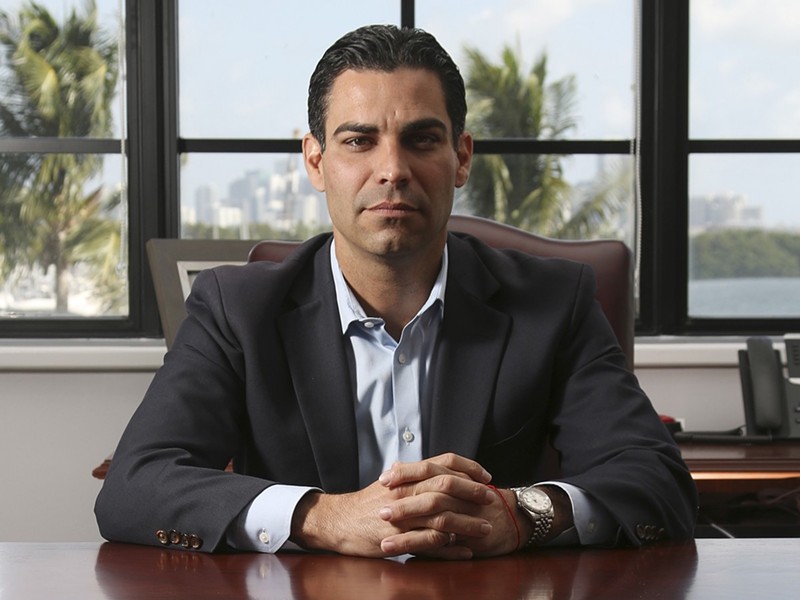But in a CNN Business editorial published yesterday, City of Miami Mayor Francis Suarez says he has a stimulus plan that will rescue renters.
"[W]e're pushing forward with a Renter Stimulus Plan, which would unlock a $45 billion stimulus at the local level — an average of nearly $1,400 per American renter," Suarez writes in the editorial, which is co-authored by Los Angeles Mayor Eric Garcetti and entrepreneur Ankur Jain.
Sounds promising, right? But as it turns out, the so-called "stimulus" is just a proposal to give back renters their own security deposits — money they've already spent, that's already theirs. Suarez and his co-authors tout this as financial aid "without help from D.C. and without taking a penny from the federal coffers."
The plan proposes "unlocking" some $45 billion in security deposits that are "sitting in escrow accounts, unused by landlords and tenants alike." Under the proposal, renters could get back their security deposits if they choose, but only if they buy a monthly security deposit insurance plan to satisfy their landlords.
Suarez, Garcetti, and Jain present this as a sort of "win-win" for renters and landlords. Renters could unfreeze hundreds or thousands of dollars to spend on whatever they need, and the insurance they'd buy would allow landlords to rest easy about covering any property damage when their tenants leave. According to the authors, the cost of security deposit insurance would be minimal for renters — a few dollars per month.
Despite its rosy-sounding name, the Renter Stimulus Plan was quickly panned by critics. Tenants unions in California and Florida thumbed their noses at the plan, arguing that any money returned to renters could hardly be considered a stimulus.
The Miami Tenants Union, a group that focuses on securing better living conditions for Miami renters, tweeted: "Who asked for this?"
Who uhhhh... Who asked for this? https://t.co/T6U5vUhqcA
— Miami Tenants Union (@miatenants) December 3, 2020
Wesley Chau, a member and organizer of the Miami Tenants Union, called the proposal tone-deaf and out of touch with the financial realities workers and tenants in Miami face. And Chau says the plan isn't particularly enterprising for a city like Miami.Reasons this won't work:
— Tenants Together (@TenantsTogether) December 3, 2020
1. Security deposits are often stolen
2. The money if recovered will simply go to back rent, not stimulus
3. It's not nearly enough money to cover debts
4. Get renters' insurance, not insurance through your landlord
5. Just cancel the rent already https://t.co/kXrAk2cZ0H
"When you're someone like [Miami Mayor Francis] Suarez or [Los Angeles Mayor Eric] Garcetti facing a pandemic with global repercussions for the housing market, you'd think you'd want a bold strategy for how to combat it, but we're getting our own money," Chau says.
"We're going to come upon the CDC eviction moratorium ending on December 31," he continues. "This means some people could be backlogged nine months of rent. Nobody's security deposit could make up for nine months of rent. That's the painful situation. There's going to be a lot of people left out of this lackluster legislation. It's just not bold enough for me."
Chau says that while the CNN piece waxes poetic about renters being hardworking and essential, the security deposit plan doesn't treat them as such.
"They talk about how renters and young people are so essential to economic recovery, yet they refuse to do anything that looks like actual help and benefits," Chau says. "That's people's money that they should already have. It's not like anyone is getting a hand."
The authors say new and current renters would be eligible for the plan in cities that make it available. Landlords would be required to let tenants claim their security deposits, and then renters would have 90 days to buy an insurance policy.
The op-ed links to a New York-based startup company called Rhino, a security deposit insurance agency that Jain helped co-found. The stimulus plan would ultimately benefit that company. Last night, Jain defended the plan on Twitter, saying, "The goal of this plan is to give people an *option* to access money they otherwise couldn't." He added that the proposal "doesn't replace the need for broader stimulus."
Soledad Cedro, a spokeswoman for Suarez's office, says the mayor will talk to the city attorney and Florida's attorney general to discuss how and whether the program can be implemented in the City of Miami and other municipalities. If the attorney general approves of the security deposit plan, Suarez would make a presentation to the city commission. There's no timeline for when the plan could be available to tenants, Cedro says.
Cedro says the mayor acknowledges the criticism and opposition.
"That you get your own money back and to do so you must spend it on insurance — yes. The idea is that the insurance will be way cheaper than paying the deposit. Of course, we understand it's your own money, but it's money that, as a tenant, you cannot use. This is the way it is."













